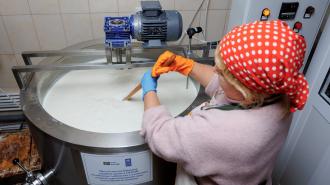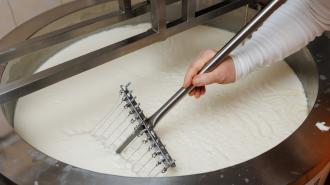Artisanal cheese production – a flourishing business on the left bank of the Nistru river
May 14, 2024

A healthy, tasty and environmentally friendly product – this was Olga Harcenko’s goal when she established a mini-factory in Tiraspol to produce artisanal cheese. Olga uses traditional cheese-making methods in the production process, which preserve the taste and nutritional value of the product for many months. “Our production is based on the idea of creating a living product. During the production we don’t use chemicals, only milk, water, salt, lactic acid bacteria and herbal enzymes,” Olga Harcenko says.
The entrepreneur’s main concern is to make the final product not only a delicious tasting experience, but also a healthy product for everyone, rich in protein, calcium and other important nutrients. Cheese is not only a valuable source of nutrients needed for normal body function, but also the most effective way to preserve dairy products. Olga believes that such activities generate additional income for farmers and contribute to the economic development of the locality.
To develop her business, Olga Harcenko participated in the competition organised by the “Sustainable and resilient communities through women empowerment” UNDP project with financial assistance from Sweden. The competition was aimed at women carrying out economic activity in households, who wanted to develop an environmentally friendly and climate resilient business.
Olga was offered modern cheese processing and maturation equipment with a capacity of 150 litres. This allowed to process milk twice as fast as before and to increase the quality of the final product. Artisanal cheese becomes more and more popular, that’s why Olga has already developed a network of loyal customers on the left bank of the Nistru river and wants to develop such a network on the right bank.
“The financial assistance and mentoring I received under the project allowed me to make my dream come true. Now I may confidently say that this was the best investment for the family’s future,” Olga Harcenko says. Being at the beginning of her journey, the entrepreneur says that the help she received from the project was a great incentive to continue developing the business and refining her cheese-making recipes.
Olga believes that making organic products is not only about caring for people’s health, but also for nature. “Natural ingredients not only nourish the body, but also impact the environment positively. Fewer chemicals used in food mean less pollution of water, soil and air. This is my small contribution to the ecological balance,” Olga says.
The same opinion is shared by Ludmila Selencova from the of Crasnogorka village on the left bank of the Nistru river, who produces artisanal goat’s milk cheese using green energy. Thanks to the assistance from Sweden under the “Sustainable and resilient communities through women empowerment” UNDP project, Ludmila has now modern cheese-making equipment and solar panels to power the cheese production line.
“Sustainability was always important to me. We not only strive to meet the needs of our customers, but also to think about the future. The use of solar panels and other renewable energy sources helps us preserve nature and become more financially independent,” she says.
These are two of the 120 women who received mentoring and equipment worth up to US$4,400 from Sweden under the ‘“Sustainable and resilient communities through women empowerment” UNDP project to initiate economic activities resilient to climate change in their households. The beneficiaries were selected during two public competitions organized by the UNDP project, involving women from Nisporeni, Călărași, Basarabeasca, Leova, Dubăsari, ATU Găgăuzia and Transnistrian region.

 Locations
Locations













